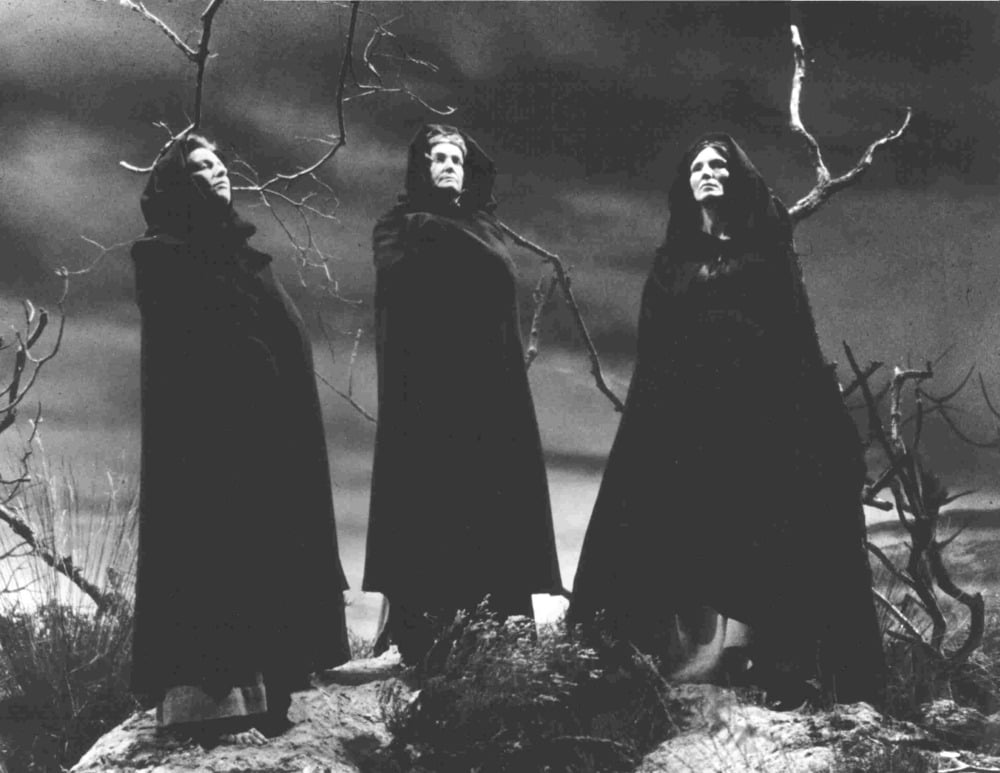When Shall We Three Meet Again in Thunder Lightning or in Rain Quizlet

In this opening scene, the three witches, or Weird Sisters (possibly Shakespeare's version of the Fates?) convene and decide when to arroyo Macbeth and Banquo with their prophecy. They call on their "familiars" (companion spirits) and depart.
Shakespear presents the iii witches meeting in the eye of a tempest and preparing to entice Macbeth into evil, the riddling rhymes show that they are supernatural.
This scene is important because it immediately grabs our attention with its dramatic non-realism, raises our marvel and expectancy, establishes the importance of the supernatural in the play and provides a clue to the fundamental theme of proficient and evil.
The beginning of this scene is fairly brief, this helps to create a sense of mystery and wonder. Litlle is explained in this scene-A violent storm, iii strange witches speaking in rhyme and waiting ominously for Macbeth.
The witches talk about Macbeth which makes the audience wonder about who is Macbeth which draws their attention in. "There to come across with Macbeth". This draws the audience'due south attention and interest, wanting to find out who Macbeth.
The Witches generally speak in rhymed couplets of trochaic tetrameter. These rhyme pairs create an incantatory (chantlike) event.
One of Shakespeare's key sources for the Witches in this scene was Reginald Scot'southward The Discoverie of Witchcraft (1584):
[Witches] can enhance and suppresse lightning and thunder, raine and haile, clouds and winds, tempests and earthquakes. Others doo write, that they can pull downe the moone and the starres. Some write that with wishing they can send needles into the livers of their enimies. Some that they tin can transferre corne in the blade from i identify to some other. Some, that they can cure diseases supernaturallie, flie in the aire, and danse with divels. Some write, that they tin plaie the office of Succubus, and contract themselves to Incubus; and so yoong prophets are upon them begotten, &c. Some say they tin transubstantiate themselves and others, and take the forms and shapes of asses, woolves, ferrets, cowes, apes, horsses, dogs, &c. Some say they tin can keepe divels and spirits in the likenesse of todes and cats.
–(Book I, Chapter 4), 246
Co-ordinate to J. A. MacCulloch (1929):
The AS wyrd is represented in English language and Scots by "weird," e.k., "he maun dree his weird" (suffer his destiny). Some link with Teutonic Fate-goddesses is therefore to exist found in the "three weird sisters" of our before literature. Holinshed relates that iii women "in straunge and ferly apparell, resembling creatures of an elder globe," met Macbeth and Banquo and foretold their destinies.
These women were either the weird sisters, that is the goddesses of destinie, or else some nimphs or feiries, endued with knowledge or prophecie by their Nicromanticall science.
They are Shakespeare's witches or weird sisters, the Fatae or Parcae of Boece's History. A story of "The weird Sisters" is mentioned in The Complaynt of Scotland, but it is now unknown, and the additions to Warner'southward Albion's England (106 A.D.) speak of "the weird elves," as Spenser has "three fatal Impes" in his Ruines of Fourth dimension, and Chaucer "the fatal sustrin" (sisters), alike to "the weird lady of the woods" in Percy'southward carol, who prophesied from a cavern most Lord Albert's kid, then stole him away and nurtured him.
Whatever the ultimate origin of the Norns and similar dispensers of destiny may have been, they had homo counterparts in actual prophetesses or magic-wielders, like the erstwhile Scots "spae-wife," who foretold an infant's futurity, or the Norse Spakona or Volva. In some references to these information technology is not easy to say where the human aspect ends and the supernatural begins. As Grimm says:
"…prophesying, inspiring and boon-bestowing women were always supposed to pass through the country, knocking at the houses of those whom they would bless, and tales of travelling gifting sorceresses were much in vogue all through the Eye Ages."
rodriguezparend59.blogspot.com
Source: https://genius.com/William-shakespeare-macbeth-act-1-scene-1-annotated
0 Response to "When Shall We Three Meet Again in Thunder Lightning or in Rain Quizlet"
Post a Comment